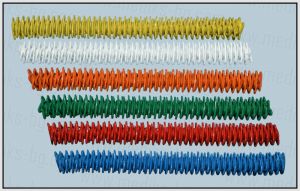Botanical Name: Cananga Odorata.
Origin: Madagascar.This extremely fragrant essential oil has a calming effect on the mind and body and is used in cases of frigidity and impotence. It has a wonderfully balancing and stimulating effect on the skin, to correct sebum production and is also used to stimulate hair growth.
Oil properties: It has an exotic, sweet smell and is slightly yellow in color.
Origin of Ylang-ylang oil: It is a tall tropical tree about 20 meters (60 feet) high with large, tender, fragrant pink, mauve or yellow flowers and is cultivated in Java, Sumatra, Reunion, Madagascar and the Comores. The name means 'flower of flowers'.
In Indonesia, the flower petals are strewn upon the bed on wedding nights. The oil was once a popular ingredient of hair preparations in Europe and was known as macassar oil. The word "anti-macassar" originated from this, since an anti-maccasar was used to keep hair oil from staining upholstered furniture.
Extraction: Ylang-ylang oil is extracted from the freshly picked flowers by water or steam distillation.
The first distillation is called Ylang-ylang extra, which is the top grade. An absolute and concrete are also produced by solvent extraction.
Chemical composition: The main chemical components are linalool, geranyl acetate, caryophyllene, p-cresyl methyl ether, methyl benzoate, benzyl acetate, benzyl benzoate and other sesquiterpenes.
There are different 'pressings' of ylang-ylang oil - with them being called 'extra' and then 1st, 2nd and 3rd pressing. The extra is the very first pressing and contains the highest amounts of esters and therefore has the sweetest odor, while the later pressings have a less-sweet odor.
The 'extra' is not used in aromatherapy, but used in the perfume industry and to have a 'complete' essential oil for aromatherapy, the 'extra' is combined with the 1st and 2nd pressings to form the complete ylang-ylang essential oil.
The ylang-ylang oil supplied by us is the best quality 'complete' oil that can be purchased.
Precautions: It is classed as a non-toxic, non-irritant and non-sensitizing oil, yet could cause sensitivity have been reported and excessive use of it can lead to headaches and nausea.
Therapeutic properties: The therapeutic properties of ylang-ylang oil are antidepressant, antiseborrhoeic, antiseptic, aphrodisiac, hypotensive, nervine and sedative.
Uses: Ylang-ylang oil has a euphoric and sedative effect on the nervous system and helps with anxiety, tension, shock, fear and panic while the aphrodisiac qualities is useful for impotence and frigidity.
It is particularly useful with rapid breathing and rapid heartbeat, it can also help with reducing high blood pressure and useful for intestinal infections.
On the skin, ylang-ylang oil has a soothing effect and its balancing action sorts out over-dry as well as overly-oily skin by balancing the secretion of sebum, and has a stimulating effect on the scalp which promotes more luxurious hair growth.
Summary: Ylang-ylang oil assist with problems such as high blood pressure, rapid breathing and heartbeat, nervous conditions, as well as impotence and frigidity.
-
Burners and vaporizers: In vapor therapy ylang-ylang oil can be helpful with anxiety, tension, shock, fear, panic, rapid breathing, rapid heartbeat, aphrodisiac, physical exhaustion, frigidity, impotence, insomnia, depression and stress.
-
Blended massage oil or in the bath: As a blended massage oil or diluted in the bath ylang-ylang will assist with physical exhaustion, insomnia, frigidity, impotence, depression, anxiety, nervous tension and stress while having a calming and aphrodisiac effect.
-
Cream or lotion: In a cream or lotion it is used to balance the production of sebum in the skin and thereby correcting and balancing overly-dry as well as overly-oily skin.
Ylang-ylang oil blends well with: Although most essential oils blend well together, ylang-ylang oil blends particularly well with bergamot, grapefruit, lavender and sandalwood.
Important Note: The information provided is for educational purposes only.






